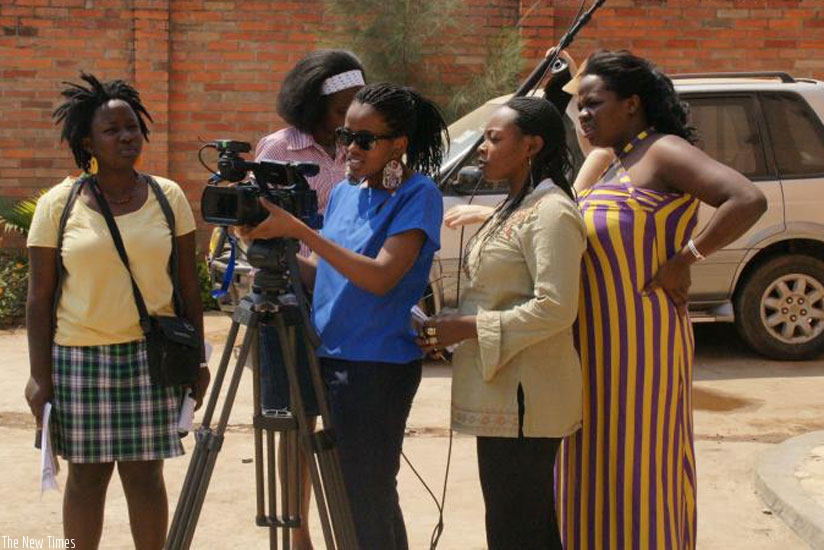Over the past two decades, Rwanda has emerged as one of Africa’s success stories and a model for reconstruction politically, economically and socially, thanks to the many reforms that have seen it emerge from the devastation caused by the 1994 Genocide against the Tutsi.


Over the past two decades, Rwanda has emerged as one of Africa’s success stories and a model for reconstruction politically, economically and socially, thanks to the many reforms that have seen it emerge from the devastation caused by the 1994 Genocide against the Tutsi.
Those talking about Rwanda’s progress easily pick out the tourism industry and the investment sector, but rarely is Rwanda’s budding film industry mentioned.
Rwanda’s richness in culture, including its visual arts, performing arts, poetry and lifestyle, is incredibly diverse for people that speak one language and occupy a small country in the heart of Africa with 11 million people.
In the film industry, the country fosters an environment for Rwandans to learn from others in their creative fields as well as to create unique performances and films.
As the experts in the industry attest, the film industry has grown to levels where it is now providing alternative employment to prospective actors, actresses and directors.
Denis Nsanzamahoro, aka Rwasa, a renowned actor, says there is a great improvement from where the film industry started five years ago to where it is today—citing lack of enough skills in filmmaking, financial support and a small market, as the main hindrances for its progress.
"Despite that, the industry is growing first when you compare it with film industries elsewhere like Nollywood (Nigeria) and Bongo Movies (Tanzania) which started more than 20 years ago. When you compare the product we put on market there is no big difference from theirs,” said Rwasa.
"But we need to seek professionals who can provide us with enough skills in the filmmaking, production, distribution… et cetera,” he added.
Today, the industry that literally started with nothing has grown through creativity, vision, collaboration and partnership.
The Rwanda Film Festival is an exceptional event that brings the art of cinema and an appreciation of film to local communities, film students, and enthusiastic film goers and to the leadership of the country.
The industry covers a variety of concepts that include scriptwriting, video editing, camera manipulation and sound. It has equipped students with knowledge and skills that have enabled them to explore the vast world through filming.
Each year, the film industry recognises movie personalities in different categories. And this month, Thousand Hills Academy Awards (THAA), an annual movie awards, organised workshops for movie personalities.
Claude Uwizeyimana, a filmmaker and a teacher at Innovation Business Techno Ledge Collage [IBTC] in Kigali, is optimistic that the growing film industry will help create employment opportunities for the youth and contribute to the country’s development agenda. "Rwandans have picked interest in the film industry and this is very encouraging, especially considering the fact that, until recently, local film industry was non-existent,” said Uwezeyimana.
Uwizeyimana is committed to producing professional students who can work in the film industry anywhere in the world.
"I started with one student but I did not give up because at the back of my mind I knew I would achieve my dream which is to produce millions of film makers in Rwanda,” a visibly jovial Uwizeyimana said. He cited the delay by the government to issue them with license as one of the challenges the budding industry is facing. Another challenge, he says, is the lack the necessary equipment which hinders the quality of their work and limits the growth of the industry.
Uwizeyimana said that he aims to contribute toward national development by training as many students as possible in film making, adding that he doesn’t intend to make profit in the short run.
Laine Muhoza, a director and actress, says that society does not understand the film industry as a whole. Being on screen as an actress in the eyes of many people in this country doesn’t mean much to them, most people hardly realise that it is a job like any other,” she says.
Muhoza, who has appeared in many Rwandan TV series and is currently directing a movie called Akabero, says that as much as the government is trying to put in more effort to streamline the field, it is giving much attention to internationals who come to make films the country.
"The fact is that we as locals know our country better than foreigners, so we should be considered before anyone else,” she explained.
Muhoza urged those who want to be filmmakers to follow their dream and believe in themselves.


